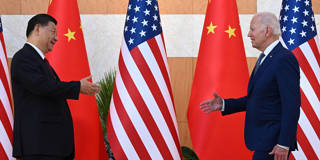 Saul Loeb/AFP via Getty Images
Saul Loeb/AFP via Getty Images
全球化大势已去?
香港—11月是一个不平凡的月份。全球领导人齐聚一堂,参加四场重要会议:在柬埔寨举行的东盟会议、在印度尼西亚举行的 G20 峰会、在泰国举行的亚太经合组织 (APEC) 论坛以及在埃及举行的联合国气候变化大会 (COP27)。引人注目的不是会议的时间安排,而是会议提供的证据表明,国际舞台上的潮流可能正在从对抗转向新的合作。
https://prosyn.org/lki9FRczh
To continue reading, register now. It’s free!
Register Now
Already have an account?
Log in



香港—11月是一个不平凡的月份。全球领导人齐聚一堂,参加四场重要会议:在柬埔寨举行的东盟会议、在印度尼西亚举行的 G20 峰会、在泰国举行的亚太经合组织 (APEC) 论坛以及在埃及举行的联合国气候变化大会 (COP27)。引人注目的不是会议的时间安排,而是会议提供的证据表明,国际舞台上的潮流可能正在从对抗转向新的合作。